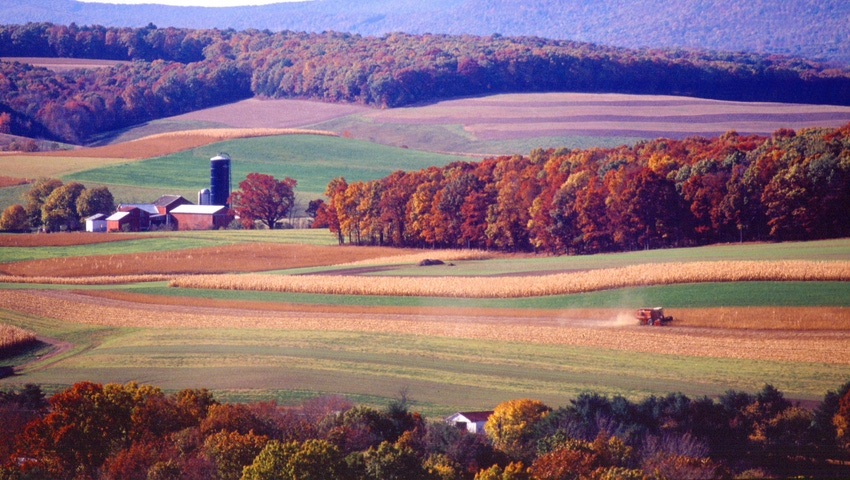
The USDA is pushing back against criticism from members of the Congressional Western Caucus over the agency's compilation of data on the increasing foreign ownership of American farmland, which the lawmakers say is endangering U.S. food security.
Caucus chairman Rep. Dan Newhouse, R-Wash., is chiding federal officials for not knowing who owns what land and where and having no plan to internally reverse the trend, which he says affects the U.S. supply chain and economy.
“Food security is national security, and we cannot allow foreign adversaries to influence our food supply while we stick our necks in the sand,” Newhouse said. “I will … be working to introduce measures aimed at fixing USDA’s internal reporting and data management to identify to Congress, and the American people, exactly who is investing in the over 40 million acres of U.S. farmland reported to have ties to foreign actors.”
Newhouse is a member of a select committee on the Chinese Communist Party and is on the House Appropriations Committee.
Process is complicated
A USDA spokesman counters that the process to report and track foreign-owned agricultural land is complex and is governed by a 46-year-old law that depends on self-reporting by foreign buyers and sellers of the farmland.
To fulfill its obligations under the law, USDA gathers information from the more than 3,000 counties and county equivalents in the United States, each with their own county clerk and recorder’s office—or none at all—feeding information into more than 50 different state systems, the agency told Farm Press Jan. 30 in an email.
"There are also 500 sovereign tribal nations with different laws, rules, and processes for tracking land ownership and land transfer, while the current funding allotted by Congress for this effort allows for a team of six full time employees at USDA," the spokesman said.
Thus, changes in the way USDA gathers information would require legislation by Congress, including funding, as well as changes in county data collection mandates, the agency asserts.
"As Congress considers the issues around the ownership of agricultural land it will be essential for them to consider a system that balances these issues and is workable for USDA, producers, landowners, and county government staff on the ground," the spokesman said.
USDA figures show foreign ownership and investment in U.S. farmland, pastures and forests jumped to about 40 million acres in 2021, up 40% from 2016. More than 500,000 acres is held by foreign entities in each of California, Oregon, Washington, Nevada and Montana, according to the agency.
GAO finds mistakes
But an analysis by the U.S. Government Accountability Office found mistakes in the data, including the largest land holding linked to China being counted twice, Bloomberg News reported.
Other challenges include the USDA’s reliance on foreigners self-reporting their activity, according to the wire service. The analysis urged that the USDA share more timely and complete data with the interagency Committee on Foreign Investments in the U.S., Bloomberg notes.
The analysis comes as a Chinese billionaire recently became the second biggest foreign owner of U.S. land, owning 198,000 acres in Oregon, according to KOMO-TV in Seattle. The billionaire, Chen Tianqiao, is the founder of an online gaming company, the station reports.
Between 2010 and 2021, foreign-owned federal land increased by 15.8 million acres, the station notes.
The GAO’s report was released Jan. 18, just as U.S. Agriculture Secretary Tom Vilsack was hosting a meeting with Tang Renjian, China’s minister of agriculture and rural affairs, to discuss collaborations on market access issues, climate change and food security, his office said.
“I look forward to further exchanges and cooperation as we continue to forge a relationship that expands and improves market access opportunities for U.S. farmers and ranchers in China, an important agricultural export market,” Vilsack said in a statement, which did not mention the GAO report.
1978 law
The 1978 Agricultural Foreign Investment Disclosure Act requires self-reporting by any foreign person who buys, sells, or holds a direct or indirect interest in U.S. agricultural land.
The USDA's Farm Service Agency in December proposed revisions to the disclosure form that would ask for additional data on long-term lessees who are required to report their transactions to USDA, the impact of foreign investment on producers and rural communities, and ask filers to voluntarily provide data that would help identify their land locations geospatially.
“USDA seeks to improve the information that we are collecting about foreign ownership and leasing of U.S. agricultural land,” said Under Secretary for Farm Production and Conservation Robert Bonnie. “This process, which includes public input on changes to the form, will lead to more insightful reporting to Congress and the public.”
Two House committee chairmen -- the Agriculture Committee's Rep. Glenn "GT" Thompson, R-Pa., and the Oversight Committee's Rep. James Comer, R-Ky. -- are willing to work with agencies and other committees "to identify legislative vehicles to address the findings of the GAO report," they said in a statement.
Almost half of states have restrictions on foreign land ownership, but efforts in Congress to pass federal curbs have so far been unsuccessful.
About the Author(s)
You May Also Like






